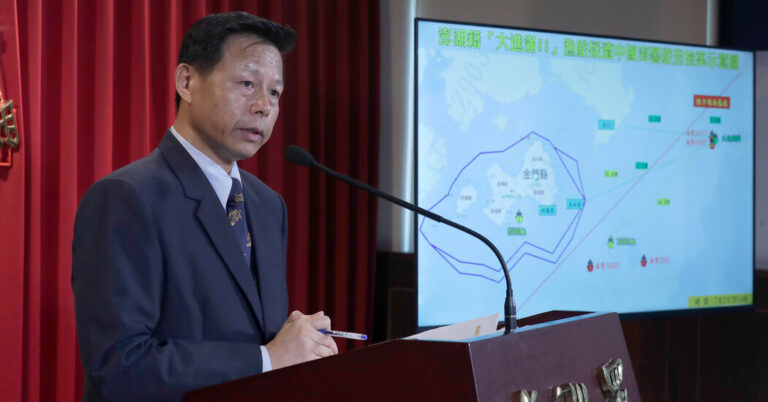The Chinese coast guard has seized a Taiwanese fishing boat and its five-person crew and forced it to sail to a port on the Chinese mainland coast, in the latest move by Beijing that is likely to increase pressure on Taiwanese President Lai Ching-te.
The fishing boat Ta Chin Man 88 was in Chinese waters 43 kilometers northeast of Kinmen, a Taiwan-controlled island off the Chinese coast, when two Chinese coast guard vessels boarded and took control of the boat Tuesday night, the Taiwan Coast Guard Administration said. Taiwanese coast guard vessels sailing to the area to assist the fishing boat were blocked by their Chinese counterparts, the administration said.
The seas around Taiwan, a self-ruled island claimed by China, have become increasingly tense, with clashes between the two sides’ coast guards appearing to increase. Officials and analysts worry that if such confrontations become frequent, it could increase the risk of a clash that could trigger a broader crisis between world powers.
Taiwanese Coast Guard vessels asked the Chinese Coast Guard to release the fishing boat, but the Chinese responded by simply “demanding that no intervention be made,” according to Taiwan’s statement. The fishing boat had two Taiwanese and three Indonesian crew members, authorities said. Many workers on Taiwanese fishing boats come from Indonesia and other Southeast Asian countries.
Hsieh Ching-chin, a spokesman for Taiwan’s Coast Guard Administration, said the Ta Chin Man 88 had entered Chinese territorial waters. The boat may have been seized because China has been more actively enforcing an annual fishing moratorium in those waters since May 1, he added.
“This year, China is different from previous years, with stricter law enforcement during the fishing moratorium,” Hsieh said at a news conference on Wednesday. Hsieh told reporters that China has seized 17 Taiwanese fishing boats since 2003, and the last such incident was in 2007.
He called on China to release the boat and its crew, and said they should not become pawns in tensions between China and Taiwan. “China should not use political factors to handle this incident,” he said.
The seizure, and especially the possibility that the ship’s five crew members could be detained in China for weeks or longer, could escalate tensions between Taiwan and Beijing. The Chinese government bitterly dislikes Mr. Lai, who took office in May, and directly rejects Beijing’s claims to sovereignty. In the months leading up to and following his investitureChina has stepped up its efforts to warn and intimidate the US president and his Democratic Progressive Party administration.
“They want to show Taiwan that they have no control over the airspace and sea space. They really seem to want to increase the pressure,” said Bonnie S. Glaser, director of the Asia program at the German Marshall Fund of the United States, referring to China’s recent actions. “I think they want to signal to Lai that he is very close to their red lines and he better not cross them.”
The Chinese government last month has issued detailed guidelines on the punishments it could impose on people it considers to be supporters of Taiwan independence, setting off alarm bells in Taiwan, particularly because the rules raise the possibility of death sentences in extreme cases. In response, Taiwan has warned its population do not travel to China.
China has also stepped up its military flights around Taiwan, which appear designed, at least in part, to weaken the island’s air force and other defenses. Nearly 300 People’s Liberation Army planes flew over the airspace off the island in June, the second-highest monthly tally since Taiwan’s defense ministry began regularly publishing such data in 2020. according to PLATrackera site that analyzes data published by the ministry.
The increased military activity does not mean an attack on Taiwan is looming, experts and diplomats say. Rather, such operations are part of Beijing’s tactics to intimidate and wear down Taiwan while avoiding a major confrontation that could involve the United States, the island’s key security backer. China’s large and well-armed coast guard force is a pillar of that campaign.
In February, a Chinese speedboat capsized after being chased by the Taiwanese coast guard, killing two of its crew members. Since then, China has repeatedly sent its ships into waters off Kinmen, which Taiwan has designated as a no-go zone.
In June, the Chinese Coast Guard imposed new rules specifying its powers to board and detain vessels in waters claimed by Beijing, and to detain foreign nationals on board such vessels.
China is using its coast guard “to put pressure on the outer islands and the main island of Taiwan,” said Ou Si-fu, a researcher at the Taipei Institute of National Defense and Security Research, a think tank under Taiwan’s Defense Ministry. “This ‘gray zone’ harassment creates a nuisance for Taiwan, exhausting it by running around, because there are so many ships, especially near the outer islands, that Taiwan has no way to effectively counter them.”


